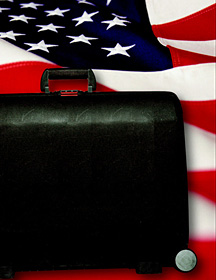
|  |  |  Editorials | Issues | September 2008 Editorials | Issues | September 2008  
Is Mexico Safe? Oregon Man's Death Fuels Debate
 Melissa Navas - Newhouse News Service Melissa Navas - Newhouse News Service
go to original


| | Mexico travel advice: The U.S. State Department issues advisories for travel worldwide, including Mexico. See Travel.State.Gov | | |
Each year, U.S. citizens travel to Mexico by the millions — more than to any other country.

Most tour, relax, work and return. They never encounter a problem.

But the recent death of an Oregon man in Mexican police custody has ignited a debate and awakened old perceptions that Mexico is unsafe and its police lawless and crooked.

Comments on online discussion boards across the nation fuel the conversation. They include messages such as, "This is not the first time nor will it be the last time this happens in Mexico ... the law works differently down there."

Whether founded in fact or fiction, the observations get the attention of diplomats, tourism officials and travel coordinators on both sides of the border. Visitors mean big money to Mexico, where tourism is the third-largest source of foreign revenue.

About 19.5 million people visited Mexico in 2007 and spent about $10.3 billion, according to G. Michael Brown, a U.S. Department of Commerce spokesman.

The recent concerns follow the death of Sam Botner, who died Aug. 27 in a two-cell jail in San Jose del Cabo, a tourist resort on Mexico's Pacific coast. A Mexican prosecutor said police beat the 38-year-old Yoncalla, Ore., crab fisherman to death. Six officers are in custody.

Unnatural deaths — such as homicides, suicides and drownings — of U.S. citizens in foreign countries are rare.

The U.S. State Department ranks Mexico as the country with the most nonnatural deaths of U.S. visitors or those living abroad during the three years ending in June. Of the 2,202 international nonnatural deaths of U.S. citizens outside the country, 637 were in Mexico. The tally, a tiny fraction of all travelers, comes from deaths reported to the State Department.

Data on police brutality against U.S. travelers are not available. But tourism officials and travel coordinators on both sides of the border said they are paying close attention to the Botner case.

But Botner's death shouldn't cast doubts about the entire country's safety, some said.

"We see crime and things that occur even in our own country," said Kris DeSylvia, owner of World Travel, a Portland, Ore., agency. "It's also imperative that you separate an isolated incident from a trend within an entire country or region."

Brent Rae, a Portland resident whose family has owned a home in Baja California Sur for more than 20 years, has seen the good and bad of the resort-laden Cabo area.

Rae said he has paid Mexican police bribes, or "mordidas," on multiple occasions. But he doesn't like to see the country get a bad reputation because "there are so many ignorant people going down there" who act differently from how they would in the United States.

"Mexico is getting a bad stigma," Rae said. "I don't think it's completely undeserved, because it is corrupt, but if people would just step back and read their 'Lonely Planets' before they go down there. It's not like you're stepping into Canada; it's a completely different culture."

Nicholas Botner, Sam Botner's father, said he hopes his son's death at the hands of police sparks outrage in Mexico.

"People who depend on tourism should demand their local government take care of this," he said. "This was a brutal murder, and there should be a public outcry to clean up their police force."

After Maureen Webster's son reportedly drowned last year at a resort in Cancun, Mexico, the Boston woman created the Web site www.mexicovacationawareness.com as a forum for people to share their travel experiences. She said she wants to inform others about Mexico's rules and legal system.

"I am not out to destroy their tourism industry. But they also need to acknowledge that there's a serious problem with the safety standards, even in these resorts." |

 |
|  |



